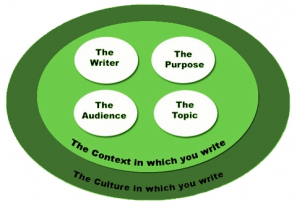
Writing Program at New College
The Rhetorical Situation
So, let’s attempt a big-picture look at rhetoric through reference to what is often referred to as the rhetorical situation. Many useful versions of this model exist, along with a great deal of scholarship, but we like this map, which we found at Minnesota State University, Mankato:

For our purposes, a rhetorical situation refers to any given time and place in which you find yourself with a task or challenge of communication. One way to break such situations into dynamically interacting elements is to identify in each a general topic; a more sharply defined purpose taken up by a writer; and an audience. Expanding our big-picture a bit, we can conceive of every writer and audience as being simultaneously situated within any number of contexts – social, geographic, cultural, and the like. Amidst this complex rhetorical situation, the more you stay focused on your purpose, the better will be the decisions you make about the issue you are addressing.
Remember that the different elements of any rhetorical situation intersect and impact one another. We do well to think of rhetorical situations as dynamic and changing systems or environments.
With this overview in mind, let’s consider once again the major components of a rhetorical situation:
You! That is, any person who plans to communicate (a speech, essay, blog post, email, letter, poem, billboard, etc.) As the image above suggests, even when taking on simple tasks, writers work within a complex environment, including, for example, your personal interests, age, cultural background, parents, and friends. All might have an impact on your writing.
Audience: Serious writers spend considerable time thinking about how to adjust their writing in order to reach their audience. Like writers, audience members are situated within specific systems of writing and reading, within a particular cultural context, and possessing a range of attitudes and knowledge about the topic under consideration.
[READ MORE] When we talk about audience, we’re talking about people, right?
Purpose: Communication is always goal-oriented, even if you are just swapping silly emails or browsing your Twitter feed. The purposes for which you will write in this course, arguably of more importance, should remain uppermost in your mind as you read, research, and write. Remain focused on purpose! What change in the world do you hope to make? How do you hope to impact your readers? Do you intend to persuade? To inform? To entertain? To instruct? To inspire? What kinds of evidence are available and likely to be convincing? In what genre should you write? hat approach will have the intended impact on your audience at this moment in time? Staying focused on your purpose can help you effectively answer these and other important questions.
Multiple Contexts: The context of your rhetorical situation can be simply conceived, for example, as the occasion for which you write, whether for a class or for professional reasons as part of your job or career. You might also consider your deadline to be part of your immediate context. How much time you have to work each day; your knowledge about your topic; your attitude about the topic; the stakes for success or failure in your writing (how much it matters, that is); how success or failure will be defined—these dynamics and many others might be part of your immediate context.
Broader social and cultural contexts will factor into any rhetorical situation. You may or may not share a set of social values with your audience. If the focus of the writing is controversial, differences and similarities in value systems can be all the more impactful. Recent events locally, nationally or internationally might bring to light new information that will influence what you write or how your audience will read about any given topic or issue. The culture of a particular institution, such as a university or a profession, can influence how you approach topics or interact with an audience. Of course your own culturally and socially determined attitudes as well as your sense of cultural or social identity will also likely influence your approach to the issue about which you write as well as your way of thinking about your audience.
Topic: Topic is the most general category for thinking about a writer’s focus, that is, her subject matter, what she wants to write about. Scholars often think in terms of the questionor problem at the center of their writing. More socially engaged writers might understand themselves as writing about an issue. A writer might be exploring the general topic of music therapy with a more specific focus on the issue of an innovative new approach in music therapy. Or, a writer might be addressing the problem of insurance companies refusing to pay for music therapy. Within this context, a writer might work with the purpose of convincing an audience that music therapy should be covered by insurance.